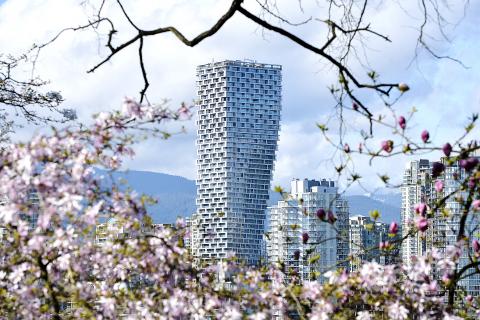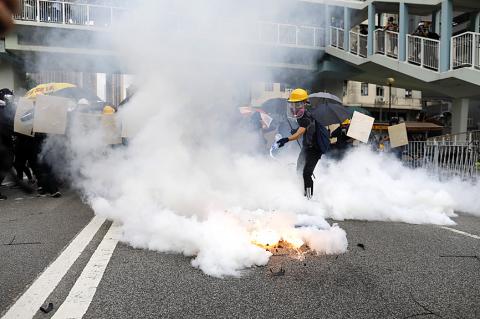As protests continue to rock Hong Kong, real-estate brokers in Canada and the UK are fielding a flood of inquiries from investors in the former British colony who are eager to get out.
Dan Scarrow, president of Macdonald Real Estate Group in Vancouver, said that many of his Chinese agents saw an uptick in interest for both sales and rentals this month from Hong Kong. One of his agents is putting off her planned retirement this year to capitalize on the opportunity.
Before, it was usually a ratio of five Chinese to one Hong Kong buyer coming to open houses, he said.

Photo: Bloomberg
“It has completely flipped now,” Scarrow said. “Whether or not that actually translates into deals, that comes down to what continues to happen in Hong Kong.”
People have begun scouting for properties in cities including Toronto, Vancouver and London as the unease surrounding Hong Kong’s political future grows amid China’s increasing influence. A drop in residential property prices is making some of these cities attractive.
“Hong Kong money could become a major source of capital,” said CBRE Ltd broker David Ho, who deals with Asian investments. “People are shocked — given that Hong Kong was always branded as a stable, rule-of-law financial hub — and now want to move their capital to other cities to mitigate the risk and also to look for other homes.”

Photo: Bloomberg
Vancouver, where housing prices have been in a slump for the past year, might be the first city to benefit from the upheaval in Hong Kong.
Changes in Vancouver tax laws have pushed property prices lower since last year, Knight Frank LLP said in a report, adding that investors would also benefit from currency-adjusted discounts of 17 percent over the last year.
Luxury homes were hit hardest by property tax changes causing the price of mansions to fall in the past few months leading to more incentives for buyers. With the city being home to a large Asian population, Vancouver is an appealing choice for many Hong Kong buyers.
“The tsunami tide of capital coming overseas in the past 10 years displaced a lot of old Hong Kong money,” Ho said. “Now, Hong Kong capital is looking at the price correction in Vancouver as an opportunity to get back in the market.”
Ho’s team in Toronto is working on more than C$400 million (US$303.25 million) of potential deals for the likes of high net worth individuals and publicly listed companies who want stability and attractive yields from the city’s real estate boom.
Canada’s biggest city is emerging as a popular choice for commercial and residential property investors given the strength of its housing market, which is partly driven by growth in the technology and financial services industries.
A weaker Canadian dollar might also mean attractive yields on some deals.
“People are looking at the future, especially people who are young professionals in their late 20s or 30s,” said CBRE sales representative Robert Veerman, who works with Ho. “They still have 50 or so years of professional life ahead of them essentially and the question is: ‘Where’s the market, jobs, growth going to happen?’”
Demand for the top 5 percent of the most expensive residential properties in London has surged from Hong Kong this year, representing about 6 percent of all prospective purchasers registering in the market, Knight Frank said.
Investment from Hong Kong is bound to grow over the next 12 months as more clarity emerges surrounding Brexit, the property consultancy firm said.
“We have suddenly had a lot of interest from our clients in Hong Kong,” Citigroup Inc foreign-exchange counselor Joe Bond said at a luxury property event in London earlier this month, adding that the instability has encouraged potential buyers to make offers.
Thanks to uncertainties around Brexit, including a weak pound and cheaper prices, London offers the greatest residential price discounts relative to the other major markets reviewed by Knight Frank. Prime residential costs in London are 28 percent lower for Hong Kong buyers than they were five years ago.
“Just eight months ago, Hong Kong clients were telling me that Brexit Britain was too unstable to buy in,” said Bruce Dear, head of London Real Estate and Institutional Investment at law firm Eversheds Sutherland.
Now, “a swan-diving pound, mass marches and a pillaged Legco [Hong Kong Legislative Council] have made British bolt-holes compelling again,” Dear added.
Sydney and Singapore are also attractive investments as government measures have limited price growth, providing opportunities for Hong Kong buyers to jump in, Knight Frank said.
Increased supply in Manhattan’s prime housing market have also stunted price growth and investors can find discounts in that space over a longer-term basis, the consultancy added.

‘SWASTICAR’: Tesla CEO Elon Musk’s close association with Donald Trump has prompted opponents to brand him a ‘Nazi’ and resulted in a dramatic drop in sales Demonstrators descended on Tesla Inc dealerships across the US, and in Europe and Canada on Saturday to protest company chief Elon Musk, who has amassed extraordinary power as a top adviser to US President Donald Trump. Waving signs with messages such as “Musk is stealing our money” and “Reclaim our country,” the protests largely took place peacefully following fiery episodes of vandalism on Tesla vehicles, dealerships and other facilities in recent weeks that US officials have denounced as terrorism. Hundreds rallied on Saturday outside the Tesla dealership in Manhattan. Some blasted Musk, the world’s richest man, while others demanded the shuttering of his

TIGHT-LIPPED: UMC said it had no merger plans at the moment, after Nikkei Asia reported that the firm and GlobalFoundries were considering restarting merger talks United Microelectronics Corp (UMC, 聯電), the world’s No. 4 contract chipmaker, yesterday launched a new US$5 billion 12-inch chip factory in Singapore as part of its latest effort to diversify its manufacturing footprint amid growing geopolitical risks. The new factory, adjacent to UMC’s existing Singapore fab in the Pasir Res Wafer Fab Park, is scheduled to enter volume production next year, utilizing mature 22-nanometer and 28-nanometer process technologies, UMC said in a statement. The company plans to invest US$5 billion during the first phase of the new fab, which would have an installed capacity of 30,000 12-inch wafers per month, it said. The

MULTIFACETED: A task force has analyzed possible scenarios and created responses to assist domestic industries in dealing with US tariffs, the economics minister said The Executive Yuan is tomorrow to announce countermeasures to US President Donald Trump’s planned reciprocal tariffs, although the details of the plan would not be made public until Monday next week, Minister of Economic Affairs J.W. Kuo (郭智輝) said yesterday. The Cabinet established an economic and trade task force in November last year to deal with US trade and tariff related issues, Kuo told reporters outside the legislature in Taipei. The task force has been analyzing and evaluating all kinds of scenarios to identify suitable responses and determine how best to assist domestic industries in managing the effects of Trump’s tariffs, he

Taiwan’s official purchasing managers’ index (PMI) last month rose 0.2 percentage points to 54.2, in a second consecutive month of expansion, thanks to front-loading demand intended to avoid potential US tariff hikes, the Chung-Hua Institution for Economic Research (CIER, 中華經濟研究院) said yesterday. While short-term demand appeared robust, uncertainties rose due to US President Donald Trump’s unpredictable trade policy, CIER president Lien Hsien-ming (連賢明) told a news conference in Taipei. Taiwan’s economy this year would be characterized by high-level fluctuations and the volatility would be wilder than most expect, Lien said Demand for electronics, particularly semiconductors, continues to benefit from US technology giants’ effort